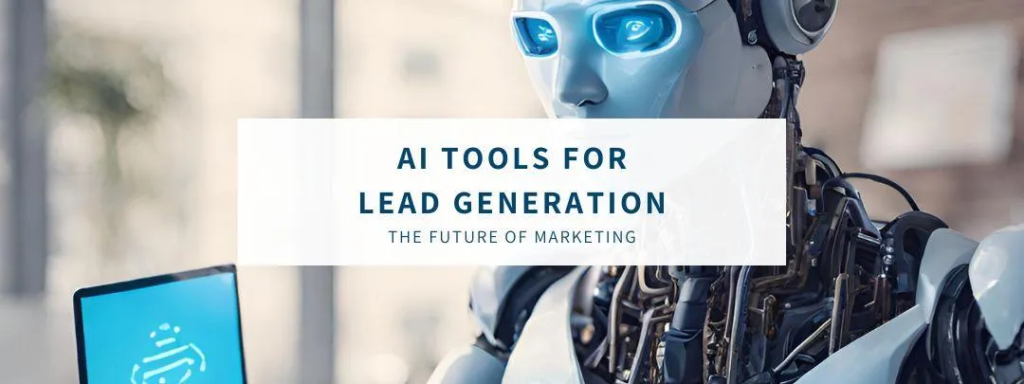AI tools for lead generation: Trends and Innovations

Lead generation is a strategic process that allows organizations to identify and engage potential clients, encouraging and guiding their interest until they become paying customers. Consider a lead as someone who is genuinely interested in your product or service. A well-executed lead generation strategy not only gives valuable customer data and insights, but also helps to make proper decisions. This, in turn, improves brand visibility and helps businesses to get high-quality leads, thus leading to strong sales growth. Although lead generation is beneficial, the process is time-consuming and requires proper preparation and execution. This includes detailed study, data analysis, and the development of exact conversion procedures. All these require a significant amount of time and work. Using AI in lead generation can give significant benefits by increasing productivity, streamlining operations, and lowering expenses. AI-powered solutions can quickly filter through massive databases, identifying client behaviors, preferences, and routines, increasing targeting precision. Furthermore, AI allows organizations of all kinds, from startups to corporations, to predict which leads are most likely to convert and where their efforts should be focused. AI-powered chatbots and virtual assistants can improve engagement by responding instantly to potential prospects. We delve further to know about AI tools for lead generation: Trends and innovations. The Shift to AI in Lead Generation: In recent years, artificial intelligence (AI) has emerged as a game changer for businesses seeking to scale lead generating initiatives. According to a Salesforce survey, companies which use AI for lead generation get an average 50% boost in leads while saving 60-70% on costs. This is mainly due to the capacity of AI to automate processes, identify high-quality prospects, and optimize marketing methods. AI technologies are more than just automation; they are also about making right decisions. By analyzing data patterns, AI can anticipate which leads are most likely to convert into sales, thus allowing organizations to keep their efforts on the appropriate leads.This predictive power differentiates AI techniques from other traditional approaches, allowing businesses to get greater results in less time. The importance of AI in Lead Generation: In this competitive world, effective lead generation is more crucial than ever. That is where artificial intelligence (AI) comes in and changes the entire process. Instead of consuming more time for searching the data of potential clients manually or filtering through large amounts of data, one can use AI to do that samework in a matter of hours easily. Because AI technologies can use clever algorithms to automatically identify high-potential prospects, analyze their behavior, and even predict their purchasing intent. What makes AI so effective in lead generation is its ability to handle large amounts of data rapidly and precisely. AI does not simply find leads; it finds the appropriate leads.It may categorize audiences based on specific characteristics such as industry, location, or interests, allowing companies to reach the correct people with the right message. Furthermore, AI can assist in generating customized interactions with leads, making outreach more relevant and timely, thus leading to increased engagement. Key trends in AI tools for lead generation As AI use is growing rapidly, three critical factors are influencing the future of lead generation. These developments are making it easier for companies to identify, nurture, and convert leads seamlessly even in a competitive industry. Hyper-targeted lead sourcing One of the most important trends in AI-powered lead generation is hyper-targeted lead sourcing. AI systems can filter through large volumes of data to find prospects who meet extremely narrow criteria. These systems consider demographics, purchasing behavior, and even social media activity to ensure that firms target the appropriate audience. Predictive Lead Scoring Predictive lead scoring is another trend that is influencing how organizations prioritize leads. AI algorithms use previous data and customer behavior to forecast the chances of a lead becoming a customer. This allows sales teams to focus their efforts on leads which have higher chances of success. Automate repetitive tasks Lead generation frequently includes repeated duties like data entry, email follow-up, and lead nurturing. AI techniques are increasingly automating many of these processes, allowing sales and marketing staff to devote more time to strategic operations. AI-powered automation saves time while simultaneously lowering the chance of human error, ensuring that no leads are missed. Real-time Data Access Access to real-time data is crucial for firms seeking to stay ahead of the competition. AI lead generating systems are rapidly providing real-time data insights, enabling businesses to make informed decisions quickly. This ensures that organizations may adapt their strategy to the newest developments and market conditions. Integration of CRM and Marketing Platforms Another emerging trend for AI-powered lead generation systems is seamless integration with CRM and marketing platforms. By connecting with existing systems, AI tools may give a complete picture of the lead generating process, from initial contact to conversion. Innovations in AI for Lead Generation While the factors listed above are driving the use of AI tools for lead generation, various revolutionary technologies are elevating lead generating to new heights. These breakthroughs are pushing the frontiers of what AI can accomplish, allowing organizations to stay ahead of the competition. AI-Powered Content Generation When it comes to lead generation, content is the king, and AI-powered content production technologies make it easier than ever to develop personalized, high-quality content on a massive scale. These technologies use data analysis to create personalized blog entries, emails, and social media postings for targeted audiences. Visual Recognition for Lead Identification Visual recognition technology is one of the most recent advancements in AI for lead generation. This technique enables AI applications to examine photos and videos to identify prospective leads. For example, AI can scan social media platforms to identify customers engaged with a brand’s products or services, and then produce leads based on these interactions. While still in its early stages, visual recognition is projected to play a significant part in future lead generation. Voice Search Optimization With the rise of speech-activated assistants like Alexa and Google Assistant,

